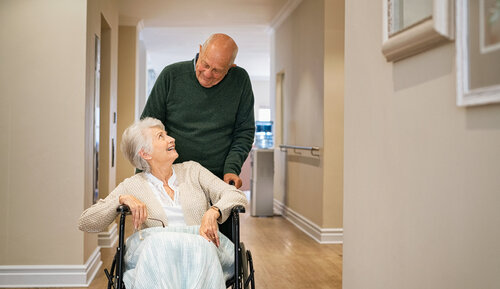
Page contents
Older people at higher risk of loneliness
Older people are at particular risk of suffering from loneliness.
As people age, their mobility reduces, meaning they can’t take part in many of the activities they used to enjoy.
In addition, retirement can lead to a loss of identity and reduce the time you spend socialising with people.
If a person is married, their spouse may be in ill health or have died, leaving them living alone. Or they may have lost their siblings and close friends.
A care home may be seen as a good option for older people, as it can benefit them both physically and mentally.
What is the impact of loneliness on older people’s health?
Loneliness can affect your physical as well as your mental health.
It can lead to:
- Higher risk of depression and anxiety
- A rise in blood pressure
- Cardiovascular problems and higher risk of heart disease.
- Weakened immune system
- It can heighten the risk of cognitive decline and dementia
- Mortality rates can be higher
Why can older people experience loneliness in a care home?
If an older person is struggling both mentally and physically at home, a care home may seem the obvious solution.
Loss of familiar social networks
Many older people move into a care home when they have lost their life partner. Or their care needs have become too much for them to continue to live independently. However a move to a care home will mean they have moved away from their familiar network of neighbours and friends and their local community. They may have lived in their house for decades and leaving it can be an emotional wrench.
Dementia
Many care home residents will be living with dementia which makes forming new friendships more complex.
Loss of purpose
Some people will enjoy the feeling of moving into a care home and not having to cook or maintain a house anymore. However for others it can take away their purpose and their identity as many enjoy the autonomy and creativity of cooking their own meals.
How do care home staff tackle loneliness?
Care home staff work hard to ensure there is a smooth transition for people moving into a home. They will encourage residents to integrate and take part in activities so they socialise with others.
Here are some things they will do:
1. Offer meaningful activities
- Care homes tend to have a activities coordinator who puts on a range of group activities such as art, music, gardening, reminiscence sessions, and gentle exercise like chair yoga.
- They encourage residents to take part in these sessions so they feel part of the care home community.
2. One to one time
Care home staff will often spend one to one time with residents and many care homes have volunteers come in who will sit and talk with the residents and do activities with them.
3. Use tech to enable residents to stay in touch with family
Since the pandemic, care home staff have become used to using tech to enable residents to communicate with family and friends facilitating video calls with tablets and phones.
4. Offer intergenerational activities and connections
Some care homes have joined up with local schools and nurseries so residents can enjoy the company of children. These intergenerational connections have benefits for both the residents and the children.
Charities such as Adopt a Grandparent have set up befriending schemes for residents and volunteers.
5. Give residents a sense of purpose
Some care homes offer residents responsibilities that will give them a sense of purpose such as leading a reading group or gardening group or organising an event.
Giving people a task to do can boost self-esteem and help give them a sense of autonomy.
Adopt a Grandparent
The charity Adopt a Grandparent pairs up care home residents with younger volunteers. The befriending scheme which aims to reduce loneliness has over 100 care homes signed up with residents getting regular video calls from their ‘grandchildren’.
14-year-old forms special bond with 77-year-old
Daniel Dominick, aged 14 and Linda Jones, 77, resident at Acorn Lodge care home – part of Avery Healthcare, met through the Adopt a Grandparent befriending scheme.
Daniel, a Duke of Edinburgh (DofE) volunteer working towards his Silver Award, joined AAG with the hope of making a real difference in someone’s life.
When he was matched with Linda, a retired nurse with a love for reading, gardening, and socialising, their bond quickly grew.
‘Wealth of shared interests’
Despite their 63-year age difference, Daniel and Linda discovered a wealth of shared interests. Their calls have become a highlight for both, with Daniel calling Linda “amazing” and saying how much he looks forward to their conversations.
Linda, who has always loved meeting new people was excited to be paired with Daniel. A lifelong learner with a passion for china collecting and storytelling, she loves sharing stories, and hearing about Daniel’s school activities, love for history, and sporting achievements.
Shaleeza Hasham, founder and chief executive of Adopt A Grandparent, said: “The enthusiasm and kindness that young volunteers like Daniel bring to the programme prove that even the smallest conversations can make the biggest difference.”
Georgia and Chris
At The White House Nursing Home in Surrey, resident Chris always found solace in the pages of a good book. Preferring quiet moments to group activities, he rarely participated in social events – until he was matched with Georgia, a volunteer with Adopt A Grandparent.
Chris, born in 1944 in India, has a rich history shaped by his father’s role in the Indian Army. His experiences growing up in India provided the foundation for his first conversation with Georgia, who had travelled there herself.
Georgia, 31, was drawn to Adopt A Grandparent after realising she had never truly known her own grandparents. Wanting to build a meaningful connection, she was paired with Chris.

A passionate classic car enthusiast, Georgia was delighted when Chris showed an interest in her 1929 Ford, leading to engaging conversations about automobiles, engineering, and their evolution over the decades.
Chris and Georgia also found common ground in their love of literature and food. Both avid readers, they have exchanged thoughts on everything from classic novels to the Famous Five series, which they both enjoyed as children. Their shared appreciation for home-cooked prawn curries has also been a topic of discussion, with Chris reminiscing about meals from his past while Georgia shares her latest cooking experiments.
For Chris, who had previously chosen to spend much of his time alone, these conversations have become a highlight. According to Emily Paton, Home Liaison Administrator at The White House Nursing Home, the impact of his pairing with Georgia has been remarkable.
Chris is now ‘more engaged and enthusiastic’
“Chris has always been independent, preferring the company of books to large social gatherings. Since his pairing with Georgia, we’ve noticed a real change – he is more engaged, enthusiastic, and eager to share his stories. It has been wonderful to see how much he enjoys these interactions.”
For Georgia, the experience has been just as meaningful. Reflecting on her motivation to join Adopt A Grandparent, she said:
“It breaks my heart to know that so many older people experience loneliness. I wanted to do something to change that. Listening to Chris talk about his life, his love for his wife Sue, and his many experiences has been incredibly special. I feel lucky to have this opportunity to learn from him and to build this connection.”
For more information on how to become a volunteer or register a care home, visit www.adoptagrandparent.org.uk.


